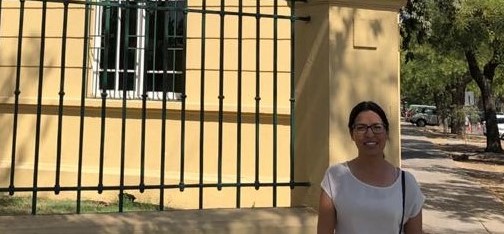From Mexico she came to Osorno to pursue postgraduate studies without thinking about the new scenario he would have to face.
Without a doubt the coronavirus pandemic has not done distinctions between countries and has managed to cross all borders. In spite of this, and from anywhere in the world, university students and graduate students have tried to continue their work routines in generating knowledge.
Fernanda Ibarra, from the Universidad Sonora de Mexico decided to arrive to Chile within the framework of the internationalization program where the Universidad de Los Lagos opens its doors every year to dozens of foreign students. No one could have suspected that the pandemic would somehow change their plans, but not their goal.
Why did you decide to study at ULagos?
The truth is that it was an easy decision for me. Since I visited the page for the first time I was very struck by everything related to the University, the cities in which their campuses were located (I fell in love with Chilean landscapes), the consolidation that has been forming at the institutional level and the projects that it had in force.
Precisely, I located the Universidad de Los Lagos by means of a project called “What Conflicts Produce” that was then being carried out by Dr. Delamaza, curiously, had presented my thesis project with a similar denomination: “The socio-legal productivity of environmental conflicts”, so that project inspired me and marked my course towards the South.
I was lucky, because everyone I have contacted at the University has been very kind to me, beginning with Dr. Delamaza who decided to support me and guide me with the internationalization staff from the beginning. Interestingly, the Universidad de Sonora (where I come from) already had a framework agreement signed with you and that made the process much easier.
That’s how this experience started for the mexican student who met Dr. Gonzalo Delamaza, an outstanding researcher who works at Ceder of ULagos in Santiago. Her stay in the capital of Chile allowed her to attend a seminar and then traveled to Osorno from this city to begin her postgraduate studies, what she did not know was that it would have to be quarantined and online due to the health crisis. Despite this she is happy with the decision taken.
How has your experience been so far?
Well, it has been very different from what was planned, that’s for sure. The health problem we are experiencing is unprecedented and I never imagined that I would come to Chile to take online courses. But well, I can still say that it has been a very productive trip, I had the opportunity to be in a University Seminar in Santiago before the quarantine and live some demonstrations closely; and here in Osorno since I arrived the postgraduate has always kept in touch with me, they quickly designed these new settings to start with the courses on the platform and the truth is I am happy with that, we are a small group and the dynamics of classes have been enjoyable and the feedback with my classmates and teachers has me very satisfied.
I am very grateful with the University, to the postgraduate in particular for having supported me in this idea of joining the program and for all the attention they have given me. Hopefully soon I will be able to meet everyone personally, get to know the university and generate other types of dynamics that complement the theoretical learning I am receiving.
What caught your attention of this program in relation to others you reviewed?
Definitely, the specialization in Territorial Studies. When I reviewed the curriculum I knew it was what I was looking for. Then I read some articles by the previous thesis students and the professors and I felt that they had a lot to contribute to me. In fact, at first my idea was an academic stay only, but when I reviewed the work that was being done in the Doctorate and discovered that they had an open call, I decided to look for the opportunity to be able to fully incorporate myself in the courses.
What are the topics that you are passionate about research, in what areas have you been related?
My areas of interest are environment and law. So environmental/territorial conflicts are phenomena in which my two passions converge. This has led me to develop research topics related to: environmental justice, social justice, guarantees, human rights, specifically access rights (to information, public participation and justice); and therefore, mechanisms for the defense and repair of environmental damage; As a result, I intend to delve deeper into issues of social mobilization, identity, territory and governance, which is what particularly brought me here.












